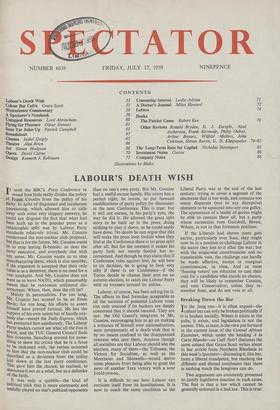LABOUR'S DEATH WISH
IT took the BBC's Press Conference to reveal how little really divides the policy of Frank Cousins from the policy of his Party. In spite of disjointed and incoherent questioning, which allowed him to sidle away with some very slippery answers, he could not disguise the fact that what had been built up in the popular press as a catastrophic split was by Labour Party standards relatively trivial. Mr. Cousins condemned the non-nuclear club proposal, but that is for the future. Mr. Cousins wants us to stop testing H-bombs: so does the Party executive, and everybody else with any sense. Mr. Cousins wants us to stop Manufacturing them, which is also sensible; If the argument is accepted that their only value is as a deterrent, there is no need for a vast stockpile. And Mr. Cousins does not Want us to leave NATO, which presumably Means that he renounces unilateral dis- armament. Where, then, does the rift lie?
Mainly in personalities. For too long, Mt. Cousins has wanted to be an Ernie 13e. vin; for too long, his efforts to assert himself have proved farcical. He has the a, VI:Ion of his own union but of hardly any- body else—except the Daily Express, which has promoted him assiduously. The Labour Party leaders cannot see what all the fuss is about, and the TUC General Council finds him tiresome. Searching around for some- thing to show his critics that he is a force to be reckoned with, the notion occurred to him that the non-nuclear club could be described as a deviation from the policy laid down at the last party conference. This gave him the chance, he realised, to denounce it not as a rebel, but as a defender of the faith.
It was only a quibble—the kind of Political trick that is more commonly and usefully played on one's political opponents than on one's own party. But Mr. Cousins had a useful excuse handy. His union has a perfect right, he insists, to put forward modifications of party policy for discussion at the next Conference. This is true: but it will not excuse, in his party's eyes, the way he did it. He allowed the great split story to be built up in the press, doing nothing to play it down, as he could easily have done. No doubt he can argue that this will make the press look foolish when they find at the Conference there is no great split after all. But for the moment it makes his party look not merely foolish but in- competent. And though he may claim that if Conference rules against him, he will bow to its decision, he is going to look very silly if there is no Conference—if the Tories decide to chance their arm on an autumn election, to catch the Labour Party with its trousers around its ankles.
Labour, of course, has been asking for it. The efforts to find formulae acceptable to all the varieties of potential Labour voter can only succeed if its backers are deeply concerned that it should succeed. They are not: the Old Guard's telegrams to Mr. Cousins, encouraging him to go on making a nuisance of himself over nationalisation, were symptomatic of a death wish that is by no means confined to the disappointed veterans who sent them. Anxious though all socialists are that Labour should win the election, many of them—the Tribunes, the Victors for Socialism, as well as the Morrisons and Shinwells—would derive some pleasure from being able to greet the news of another Tory victory with a sour I-told-you-so.
It is difficult to see how Labour can extricate itself from its humiliations. It is now in much the same condition as the Liberal Party was at the end of the last century: trying to cover a segment of the electorate that is too wide, and contains too many disparate (not to say disruptive) elements to be squeezed into any one galley. The appearance of a leader of genius might be able to contain them all, but a party whose succession runs Gaitskell, Bevan, Wilson, is not in that fortunate position.
If the Liberals had shown more guts earlier, particularly over Suez, they might now be in a position to challenge Labour in the sector they lost to it after the war; but with the single-seat constituencies and no transferable vote, the challenge can hardly be made effective, except in marginal constituencies, in time. And as most 'floating voters' are reluctant to cast their vote for a candidate who stands no chance, they will be likely to remember Cousins, and vote Conservative; unless they re- member Suez, and do not vote at all.






































